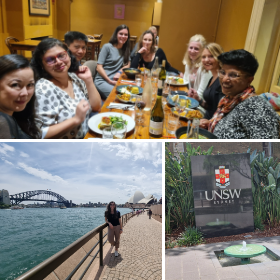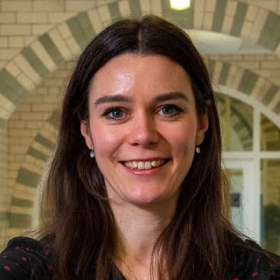It’s only taken 2.5 years to finally go out to Australia as part of my Wellcome Trust funding. There was a time where I thought it would never happen, but I’m so pleased it was finally possible to connect in real life with some researchers I’ve worked with remotely on routine data in dementia care, and to meet a great number of brilliant minds over there.
In an age of COVID-19 and since, travel and face-to-face meetings and events are a rarity. We have all had to adapt to stay connected remotely during the pandemic, and this way of working has remained for the large part. This makes of course sense as it is so much easier to have meetings and quickly discuss things with people within your country, at your University, or on the other side of the globe. However, just like with care delivered remotely not having the same benefits as face-to-face care, there needs to be a healthy mix of meeting face-to-face for larger events and activities, and doing our day-to-day job remotely from the ease of our surely now well designed and heavily plant-populated home offices (also called office jungle).

Montage of pictures from Dr Clarissa Giebel research trip to Australia in 2022
In November, I was fortunate enough to finally board the plane(s) to Sydney, to do a whirlwind tour of dementia and ageing academia in Sydney, Melbourne, and Adelaide. I was really excited to meet so many people in person, share my research into inequalities in dementia care [1], and hopefully establish some new working relationships. My trip far exceeded my hopes of the trip, and I must admit I do miss my time in Australia already.
So where did I go? Besides a lot of Australian wildlife appreciation at Taronga Zoo and Cleland Wildlife Park, I gave a series of talks and guest lectures at the University of New South Wales, Macquarie University, Monash University, NARI, and to top it off an invited plenary talk at the 55th Australian Association of Gerontology Conference in Adelaide. It was a brilliant opportunity to discuss my research and place it into different contexts with Australian researchers, care providers, and carers, and learning about the aged care system down under. There are striking similarities of course, more so in the many barriers which people with dementia can face when trying to access care.
I’ve also learned about Aboriginal aged and dementia care, learned more about Moving Pictures [2], and had so many interesting discussions over lunch, dinner, teas, and other sources of food and drink that I’m still processing all of those!
 [3]
[3]A return flight from London to Singapore creates 3 tonnes of CO2 per passenger. That’s the equivalent of heating a family home for a year. Please consider offsetting your flights.
Thanks to my visit, I’m setting up new collaborations to apply for joint grant application and compare the UK and Australian dementia care system, and apply for routine data together. Thanks to meeting in person, I’ve learned a great deal and was able to reflect on different care practices, contexts, and experiences. Thanks to going to Australia in person, I feel even more motivated and have new ideas on how we can try and reduce inequalities in accessing care, together. Oh, and I do think a few more people have become aware of our Liverpool dementia research as a very nice side bonus! All of this would most certainly not have been possible by conducting a few Zoom meetings and emails.
That’s why research needs to be international and collaborative, involving strategic face-to-face visits, meetings, and activities. I feel encouraged to have met so many passionate people in the field, and I’m really looking forward to expanding and solidifying the link between Liverpool and Australia. For now, that means grant writing, data applications, and a brand new The Ageing Scientist podcast [4] on Australian dementia and aged care! In the medium term, that means me hopefully going back next year to build on Trip 1.

Dr Clarissa Giebel
Author
Dr Clarissa Giebel [5] is a Senior Research Fellow at the University of Liverpool and NIHR ARC North West Coast. Clarissa has been working in dementia care research for over 10 years focusing her research on helping people with dementia to live at home independently and well for longer, addressing inequalities that people with dementia and carers can face. Outside of her day work, Clarissa has also organised a local dementia network – the Liverpool Dementia & Ageing Research Forum, and has recently started her own podcast called the Ageing Scientist [4].